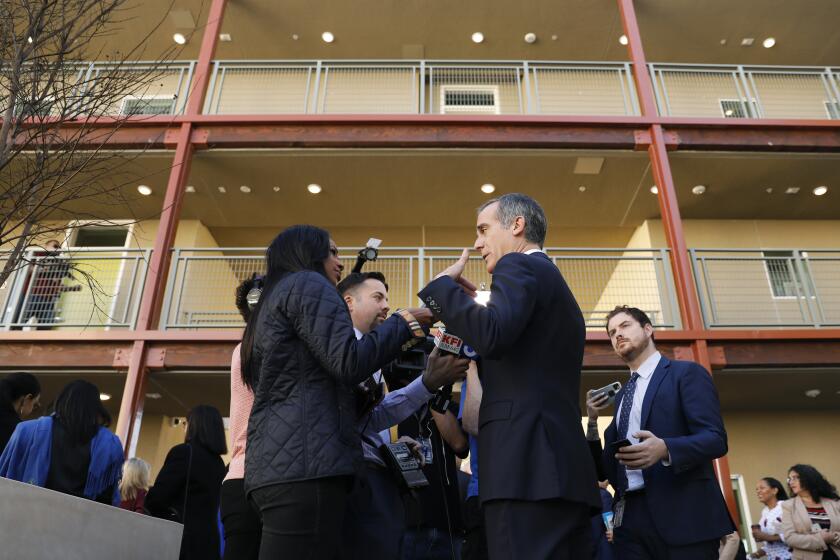Endorsement: California has money for homeless housing. Vote yes on Proposition LH so L.A. can use it

- Share via
Proposition LH on the Nov. 8 Los Angeles ballot shouldn’t be necessary. But because an archaic and racist provision to block public housing remains in the California Constitution, L.A. could miss out on funding available to build homeless and affordable housing without passage of this procedural measure.
Proposition LH would allow the development, construction or acquisition of up to 5,000 additional affordable housing units in each of the city’s 15 council districts. It wouldn’t require the city to build, acquire or permit a single unit, nor would it generate money for affordable housing. It’s simply an authorization for up to 75,000 units of new publicly funded affordable housing across the city.
Los Angeles last received this authorization in 2008, when voters overwhelmingly allowed up to 3,500 units of publicly funded affordable housing in each council district. Since then, as the homelessness and housing crisis has grown more dire, and voters and lawmakers have committed funding to build more affordable homes, some council districts are close to hitting that 3,500-unit limit.
The L.A. Times’ editorial board endorsements for statewide ballot measures, elected offices in Los Angeles city and county, L.A. Unified School District board, L.A. county superior court, statewide offices, the state Legislature and U.S. House and Senate seats.
Without a new authorization from Proposition LH, large swaths of the city — including downtown, the Eastside, Hollywood, and parts of Central and South L.A. — will soon hit the cap, meaning the city and state could no longer approve publicly funded affordable housing projects in those areas. That could halt developments for seniors, veterans, families and people on the verge of homelessness. State and local funding for affordable housing would go to other communities and cities.
Why is the Proposition LH authorization even necessary? Because of Article 34 in the state Constitution, which was adopted in 1950 amid a discriminatory backlash against public housing. It requires that cities get voter approval before they build “low-rent housing” funded with public money.
A real estate industry group drafted the constitutional amendment after the federal Housing Act of 1949 banned explicit racial segregation in public housing. The ballot initiative was framed as a way for residents to preserve “local control.” But although it was cynically wrapped in the guise of grass-roots democracy, giving voters the right to veto public housing was really just a way to let the mostly white voters bar low-income and minority residents from their communities.
Advocates need money to fund a campaign to repeal a provision in California’s Constitution that makes it harder to build affordable housing.
It worked. By 1968, voters across the state had turned down nearly half the public housing that had been proposed, and many communities shelved projects rather than put them to a vote. Eventually, developers and cities found ways to get around the constraints of Article 34, including asking voters to adopt broad measures such as Proposition LH authorizing an overall number of new public housing units.
While voters in L.A. have repeatedly approved additional units — and can do so again by passing Proposition LH — Article 34 creates unnecessary bureaucratic hurdles to addressing one of the city’s biggest problems. Fortunately, California voters will have an opportunity to repeal it through a constitutional amendment on the 2024 ballot.
It’s long past time to remove this racist relic from the California Constitution. Until then, Los Angeles voters can continue the city’s progress toward easing the homelessness and affordable housing crisis by voting yes on Proposition LH.
More to Read
A cure for the common opinion
Get thought-provoking perspectives with our weekly newsletter.
You may occasionally receive promotional content from the Los Angeles Times.












